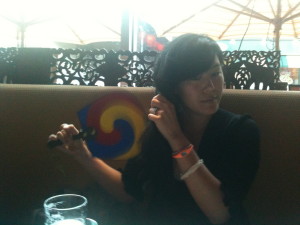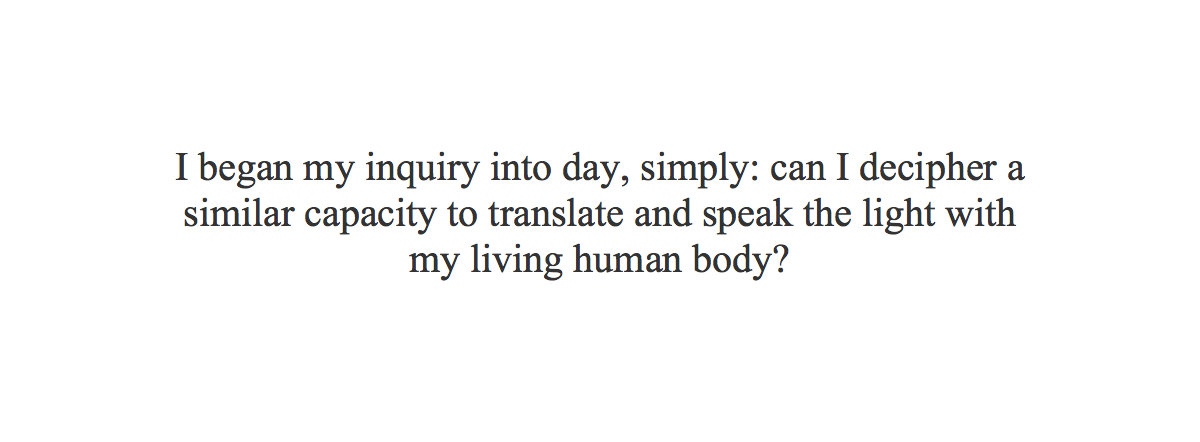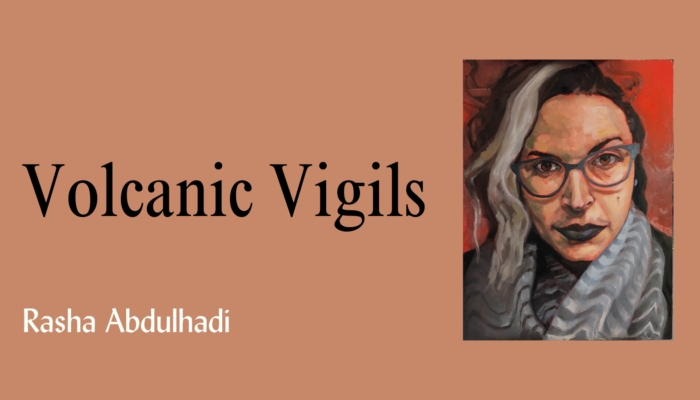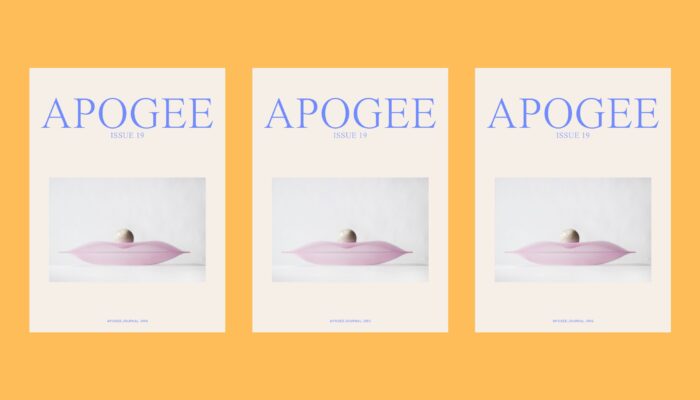Sueyeun Juliette Lee has produced some of my favorite poetry. Hers is a craft that inspires me to endeavor deeper. She’s a phenomenal poet, whose work I deeply admire and respect, so when she offered to share an excerpt from “Relinquish the Sky” with Apogee Journal for Issue 8, I was ecstatic. Of Lee’s work, Bhanu Kapil says, “ A ‘great disturbance.’ A ‘magnetic delivery.’ Hold your breath in the bathtub: to ‘alter weather patterns.’ To belie: a ‘longing,’ the ‘discrepancy,’ how the light itself accrues a ‘stop-motion’ brilliance in the moment…” Lee’s “Relinquish the Sky” leads with the piece, “Daylight, No Grief”, which begins as a mote of a light permeates across distance from its absolute origin, catalyzing her inquiry. In her piece, Lee approximates origins against lack and the monstering potential of a cultural orphan grief.
—Joey De Jesus
Daylight, No Grief
“HAIL, holy Light, offspring of Heaven first-born!”
John Milton, Paradise Lost
Of firsts and beginnings, light knows the most. In its primary, faint motion of micro-tremor then radiant turn, swelling with uplift and slight ecstasy, it is light that knows all true names.
To seek out origins and their progressive trajectories, we have taught ourselves to investigate the phenomenal rays of long duration from star swarms and curling celestial storms, translating the myriad intensities of their transmission into timelines, elemental compositions, interior tectonics and churn. We peer into the sun’s blinding recesses and can reasonably conjecture at a massive discharge’s origins to its finest shred of that first instant. We attune ourselves to light’s potencies and emerge otherwise. With insight. We know.
I began my inquiry into day, simply: can I decipher a similar capacity to translate and speak the light with my living human body?
And by doing so, can I relinquish the intensities of orphan grief?
To speak with light is to encounter the trace of the originating mother body through its lost child. An orphan being, the light reaching us is jettisoned without turning its head back home. A constant flight… of some varieties in duration or decay, but ever onwards and with consistency in its appeal. The steadfastness of its message across vast spans remains nearly uncorrupted, and we can look back through its narration into a body that is no longer there.
Oh tell us where you came from. Tell us of that body, its home.
My intuition told me that by confronting this originating, orphan phenomenon fully–by admitting its potencies, its possibilities to transmit into and transform me–those aspects in me that were steeped in abandonment could be relinquished and freed. As an evaporation, a total admission into the sky’s aerial, benign intelligence.
I want to inhabit that day.
~
What follows is an off-the-cuff style interview between Apogee’s Joey De Jesus and Sueyeun Juliette Lee:
Joey De Jesus: Speaking from my own experience of limitations, I’ve recently been feeling like, to be an artist, to be a poet, so often requires leaving the proximity of community in service of acclaim, maybe a geographic mobility—there is so much work to be done. These pieces, but also Solar Maximum, which I think is just glorious, capture a sense of impermanence or transience, and I wonder about your relationship to the history of your working life and how that has informed these pieces? And what of your community? In what ways might they give your work sustenance?
Sueyeun Juliette Lee: I’ve been very fortunate to have an incredible artist, scholar, and writing community—some were centered on geography (western MA, Philadelphia), others around interest (Asian/American scholars and artists, poetry). I’ve never technically felt like a transient or that I was only “passing through” a place, in that I feel like I invest myself wherever I am and work hard to be present. I think my imagination is one that is incredibly aerial, in that I tend to be fascinated/inspired by things in transit or flight, that are immaterial, like light, sky, the flow of information. As a person in the world, I can’t help but acknowledge that we have limited time on this planet. Losing a good friend suddenly through an unforeseeable accident can do that to you—you feel how fragile we are, how arbitrary each day can be. Some of that is probably also rooted from my days working on campaigns–there are always these impossible goals with mind-boggling consequences, like REGISTER 10,000 PEOPLE TO VOTE OR SATAN GETS ELECTED, etc, that I completely bowed to for a few years. And even when the goal was met, the fight always continued. It made me feel the work was essential but also that I was small in it. Maybe that’s not such a bad thing, especially given our political climate now. The work is essential, and yes, we are small in it.
My community is life-sustaining for me. I’m very fortunate to know so many people, to have spent time together and have them share some of their lives with me. There are a special few whose work, intellect, and friendship feel like “home” to me—Michele Kishita, Janice Lee, Douglas Kearney, Brenda Iijima, Tyrone Williams, Timothy Yu… We’re not in close contact, but when we see each other, I feel like no time has passed. Their work inspires me and keeps me connected to the incredible promise of art-—of engagement, of transformation.
I spent almost 7 years in Philadelphia, and it was an incredible time for me. That community was so special to me—it was cross-generational, cross class (for the most part), and cross-institutions—though it was often centered on the writing programs there, I found that the most interesting folks weren’t associated with schools, like CA Conrad, Frank Sherlock, Anne-Adele Wight, and Jacob Russell. Being involved in the Asian American arts community through the Asian Arts Initiative (based in Philadelphia) and occasionally helping out at the Asian American Writers’ Workshop, helped me remember that white-dominated poetry world wasn’t the end-all of being an artist (THANK GOODNESS!) but that there are SO MANY vibrant and interesting things happening outside of those very small circles. So, I think I’ve had some perspective on the wonderful, magical opportunities that I have had as a writer and artist, and also what those things mean in the broader scheme of being a creative person trying to engage meaningfully with the world.
JDJ: I think your work conjures along a horizon definitive images of a cusp, in a way that evokes bewilderment; I’ve always thought that to be bewildered is to be lost in the experience of novelty. To be entirely awash in lostness. What informs your sensibility or (non-)definitions of bewilderment? Could bewilderment be a tenet of cultural orphaning? Is it a “novel vacuity” or can bewilderment be endless?
SJL: Bewilderment is definitely a tenet of cultural orphaning and, more broadly, of grief. Grief, as those who have had to swim in those dark waters, can be endless. Brenda Iijima once said to me something along the lines that pain makes us sparkle/magnetic. When you’ve been hurt in a particular way, you can be highly sensitized to the world and lives around you. For example, after my friend died, I would watch the light shift through the sycamore leaves outside the window and sob at how beautiful and senseless it was—that this world without her remained beautiful, awfully so. From my own experiences, I can say that this mode of bewilderment may feel endless because it engulfs you so fully, it overwhelms you with a black transcendence. It literally rewrites your DNA. After dwelling in that space for a while, I have become numb to a lot. Right now, for example, happiness feels like something that I look at from my window; it’s like a suitcase I left on the curb. No one will take it because it’s mine, but it’s outside.
JDJ: Light, obviously, is central to your work—what are your current proximities to light? How do you think your fixations on light have changed across your body of work?
SJL: LIGHT. Ah. It’s everywhere to me, for now. I was told last year that I am at high risk for a degenerative eye disorder leading to blindness, for which there isn’t a cure. I am now hyper-sensitive to any shifts in my vision, which can be emotionally exhausting. Did you know that our vision is quite plastic? That it actually changes quite a bit from day to day, even hour to hour. For the most part, if you are well-sighted, you don’t freak out over those small changes. For me, I try not to freak out over those changes, and yet I can’t help but be hyper-conscious of them. Some things have changed and aren’t going back. Like, I can’t drive on highways at night anymore. I now have small dark spots in my vision—my brain is learning to ignore them, but sometimes I fixate on them.
And so—my proximities to light…. they feel deepened. I can’t take it for granted, that’s for sure. Maybe in response to that, my work has been more personal the last few years. I’ve been wanting to communicate IN LIGHT, and so I’ve been working more in video. I’ll sometimes include myself, my body and its movements, in the shots. I was never someone who spilled their life out on page, and yet I’m slowly becoming more that way. I guess it’s because I now feel my life is a story in light. Not just me, though, but all of us. I’m transmitting and shining into you, you are transmitting and shining into me. We’re touching, softly, and I want to honor that.
JDJ: Like… America. America right now? They’ve just stopped pretending. What is the power of a speculative poetic or in what ways does the imagination defy into being?
SJL: The speculative is the only way we can have a vision for the future, because the circumstances of our collective lives right now strive to tell us the world can never be any other way. To have fantasy, to dream, to have righteousness or hope, we must open ourselves to the speculative, we must summon its transgressive-ness and non-conformity into us. I always felt that to really be an artist of any stripe was to rehabilitate the human imagination, to intervene in it. And what we see when we see injustice is a failure of the imagination.
JDJ: Can you speak to the pieces that didn’t appear in Apogee? How those pieces complete the whole?
SJL: That would be hard to me to say here, but the work, “A Broken Link in a Chain” is kind of a memoir, speculative text, dream, and vision statement for the WTF that is cultural orphaning.
JDJ: In “A Broken Link in a Chain”, you write, “Reft from ancestors, family, homelands, and languages, these orphans populate my spirit. And I of them, too.” This moment resonates deeply in me—the population of the spirit, to suffer “terrible, consequential dreams.” I wonder if you can speak to this moment in the piece: to be populated by many, to house what seems a nation.
SJL:
To be populated by many is to be a witness.
The nation is supposed to be a consensus, and many of us are now saying “no” and recognizing how so many have said “no” before.
To be an artist is to speak for yourself, but also to know your voice is amplified by those who came before you, that you should also be quiet for those who come after.
We live, and also we are hurt. We are hurt, and we keep going. We also have joy. Sometimes this joy is pain. Sometimes this joy is joy.
Read Sueyeun’s poem, “Relinquish the Sky” in Apogee Journal Issue 08.

Sueyeun Juliette Lee grew up three miles from the CIA. She edits Corollary Press, a chapbook series devoted to multi-ethnic innovative writing, writes reviews for The Constant Critic, and is a contributing editor at EOAGH. Her books include That Gorgeous Feeling (Coconut Press), Underground National (Factory School), and the chapbooks Mental Commitment Robots (Portable Press at Yo-Yo Labs), A Primary Mother (Least Weasel Series at Propolis Press) and No Comet, That Serpent in the Sky Means Noise (Black Warrior Review). You can find her at silentbroadcast.com.




